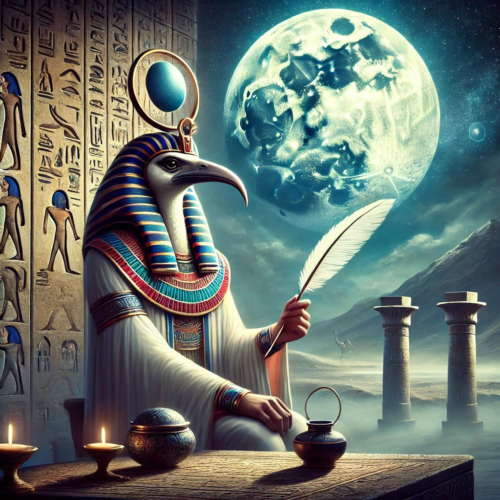Thoth, also known as Djehuti, is one of the most revered deities in ancient Egyptian mythology. As the god of wisdom, knowledge, writing, and the moon, Thoth held a vital role in maintaining balance and order in the cosmos and the lives of the Egyptian people. His influence extended beyond the divine, shaping the intellectual and spiritual foundations of Egyptian civilization.
Depictions and Symbolism
Thoth is often depicted with the head of an ibis, a bird associated with wisdom and precision, or as a baboon, symbolizing thoughtfulness and clarity. In both forms, his image evokes intelligence, foresight, and the power of knowledge. He is sometimes shown wearing a lunar disc on his head, reflecting his connection to the moon and its cycles, which the Egyptians closely linked to timekeeping and cosmic order.
As the inventor of hieroglyphs, Thoth is frequently portrayed holding a reed pen and inkpot, symbols of writing and record-keeping. These tools highlight his role as the patron of scribes and the protector of written knowledge. The ancient Egyptians believed that Thoth gifted humanity the ability to write and preserve information, enabling cultural and intellectual progress.

Roles and Attributes
- The inventor of writing and keeper of knowledge: Thoth is credited with creating the Egyptian system of hieroglyphs, the sacred script used to document history, rituals, and the deeds of the gods. He safeguarded the accuracy of written records and ensured that the knowledge of the divine and mortal realms was preserved for future generations. Scribes honored him as their patron, invoking his guidance for clarity and precision in their work.
- The moon god and keeper of time: Thoth’s association with the moon extends to his role as a timekeeper. He measured the passage of time and regulated the lunar calendar, which governed agricultural cycles and religious festivals. His connection to the moon also positioned him as a mediator between light and darkness, symbolizing balance and renewal.
- Judge and record keeper in the afterlife: Thoth played a crucial role in the Weighing of the Heart ceremony, a central event in Egyptian beliefs about the afterlife. After death, a person’s heart was weighed against the Feather of Ma’at, the symbol of truth and justice. Thoth, as the divine scribe, recorded the results with impartiality. If the heart was found pure, the deceased was granted eternal life. If it was heavier, signifying sin, the soul faced destruction. Thoth’s involvement underscored his role as a just and wise arbiter.
- Healer and protector: Thoth’s wisdom extended into the realm of healing and medicine. He was revered as a divine healer who possessed profound knowledge of medical practices and remedies. His association with specific medical texts reflects his role as a guide for physicians and caretakers in ancient Egypt.
Myths and Stories
One of the most celebrated myths involving Thoth is his rivalry with the chaotic god Seth during the reign of Horus. In this tale, Thoth emerges as a peacemaker and counselor. He offers strategies to restore balance and justice in a time of disorder. His cleverness and neutrality exemplify his importance as a mediator in divine conflicts.
Thoth created of the Book of Thoth (duh). This book contained a mythical collection of magical knowledge, further cements his image as the ultimate source of wisdom. According to legend, only the most worthy could access the book, as its powerful contents offered insight into the secrets of the universe and the ability to control nature.
Cult and Worship
Thoth’s primary cult center was in Hermopolis (known as Khmunu in ancient Egypt), a city dedicated to wisdom and learning. Here, he was worshiped as the principal deity and was part of the Ogdoad, a group of eight primordial gods associated with creation and cosmic balance. Festivals and ceremonies honoring Thoth often celebrated his roles as the guardian of knowledge, protector of scribes, and the mediator of truth.
In addition to his role in Hermopolis, Thoth was invoked across Egypt, particularly by scribes and scholars who saw him as a source of inspiration and guidance.
